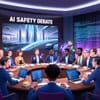The conversation around AI safety is complex and multifaceted, with various stakeholders presenting different perspectives. At the heart of this discussion lies the role of AI skeptics, who challenge the prevailing narratives and assumptions about AI's capabilities and risks. These skeptics argue that the current focus on hypothetical scenarios, such as artificial general intelligence (AGI), might distract from more pressing issues related to AI's real-world impact.
AI skeptics emphasize the importance of grounding discussions in empirical evidence and practical realities. By questioning exaggerated claims about AI, they help prevent the spread of misinformation and ensure that solutions address actual problems rather than hypothetical dangers. This skeptical approach encourages a more nuanced understanding of AI's potential benefits and risks, allowing for more effective policymaking and regulation. Healthy skepticism can prevent the misuse of AI by promoting transparency, accountability, and robust testing.
However, the skeptical perspective faces challenges in the current discourse. The dominant narratives around AI safety often prioritize speculative risks over proven issues, such as bias, disinformation, and cybersecurity threats. Skeptics argue that this focus on AGI and superintelligence might lead to misguided policies that neglect more immediate concerns. Moreover, the pressure to conform to certain narratives can stifle dissenting voices, making it essential to foster a culture of open debate and critical inquiry.
To ensure a balanced approach to AI safety, it's crucial to incorporate diverse perspectives, including those of skeptics. By acknowledging the complexities and uncertainties of AI development, we can work towards more effective and inclusive solutions. This involves promoting transparency, encouraging critical thinking, and addressing the real-world implications of AI systems. Ultimately, a more nuanced understanding of AI's potential benefits and risks will help us navigate the challenges and opportunities presented by this rapidly evolving technology.


